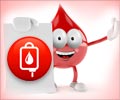Scientists identify enzymes secreted by human gut bacteria that may be able to help convert A, B and AB group blood to O group blood or universal blood -blood that can be given to persons having any blood group
Highlights:
- Scientists identify enzymes secreted by bacteria in human gut that can convert A, B and AB group blood to O group blood, which is universal donor
- O- Group blood can be transfused to persons of other blood groups in a medical emergency if the matching blood group is not available
- Finding a safe, efficient and economical way to convert other blood groups to O group will be useful to overcome shortage of blood during times of emergency and disaster
"We have been particularly interested in enzymes that allow us to remove the A or B antigens from red blood cells," Stephen Withers says. "If you can remove those antigens, which are just simple sugars, then you can convert A or B to O blood."
Finding a Way to Convert Other Group Blood to Universal Donor Group O
The current study was undertaken to look for answers to overcome serious shortage of blood such as occurred during the recent raging storms along the U.S. East Coast, prompting the Red Cross to issue an urgent call for blood donations Easy availability of O group universal donor blood in such situations could help save several hundred lives.Previous studies have been unsuccessful in finding efficient selective enzymes that are also safe and economical in achieving this.
- To hasten the process, Withers worked with a colleague in metagenomics where the DNA of millions of organisms found in the environment are directly extracted and mixed together for analysis, overcoming the need for separate cultures and isolation of specific organisms
- The mixed up DNA of various organisms were analyzed using E coli bacteria to selectively look for DNA containing genes that code for enzymes that can remove sugar residues from a molecule.
- Withers and his team had considered working with DNA of leeches and mosquitoes, organisms known to degrade blood and finally found the enzymes they were looking for in human gut bacteria
- The enzymes are used by gut bacteria to remove the sugars from the mucus lining (mucin) of the intestine, to provide energy for their activities
- The newly identified family of enzymes was 30 times more effective at removing blood group antigens on red cells than previously reported enzymes
Future Research Plans
- Withers is currently working with colleagues at the Centre for Blood Research at UBC to validate the results of their study and test the enzymes on a larger scale for possible clinical testing in the future
- Additionally, he plans to undertake directed evolution, a protein engineering technique that mimics natural evolution, with the aim of producing the most efficient sugar-removing enzyme
Why O Group Is Universal Donor - About Blood Groups in Brief
There are 4 blood groups namely A, B, AB and O. Red blood cells of persons with A, B and AB blood group have A, B and both A and B antigens respectively on their surface. O group persons have no antigens on their red cells.If persons with A, B or O group receive mismatched blood, they can develop potentially fatal transfusion reaction. AB group persons can however receive A,B and O blood and are termed universal recipients (since they have both A and B antigens and will not develop a transfusion reaction).
Since O group blood does not have any antigens on its red cells, it cannot induce an immune system mediated transfusion reaction in the recipient and is termed universal donor blood and can be safely given to persons having other blood groups, especially in an emergency.
Conclusion
In conclusion, should the gut bacterial enzymes prove to be a safe, effective and a cheap way to convert donated blood to universal group O blood, and become approved for clinical use, it could solve the problems of shortage of lifesaving blood and be a game changer in managing medical emergencies in futureReference:
- Gut bacteria provide key to making universal blood - (https://phys.org/news/2018-08-gut-bacteria-key-universal-blood.html)
Source-Medindia














